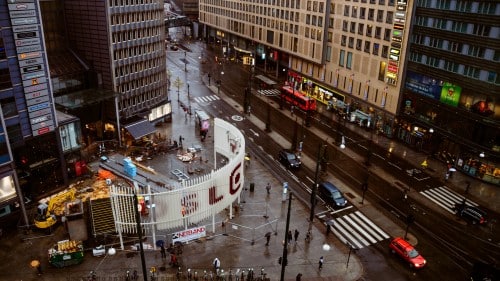Ahead of the Paris climate change conference that opened this week, the OECD countries are stepping up and formulating ambitious action plans to reduce greenhouse gas emissions. In Oslo, for example, they announced that by 2019 the city center will become a car-free zone
Maya Falah, Angle - news agency for science and the environment

If by 2020 we manage to reduce greenhouse gas emissions by 20% compared to the 90s, in accordance with the goals defined at the Copenhagen conference held in 2009? It seems that in Israel the answer is no. The national plan to reduce greenhouse gas emissionsFrom 2010, in which Israel pledged to reach these goals, was canceled last August, and for the climate conference in Paris, new goals were set that will be valid in 2030.
While many countries are making efforts to reduce emissions in their area according to their previous commitment, and are already planning the next and even more ambitious goals that will be presented in Paris, Israel sets a much lower bar than is common in OECD countries: the average goal for reducing emissions in these countries is about 33% compared to 2005 , while The destination defined in Israel It means Immigration A total of 14% in emissions by 2030.
Take the cars out of the city centers
Meanwhile, in Norway, the government has announced that by 2019, the center of the capital Oslo will becomeCar free zone.
Air pollution from transportation is one of the main causes of both greenhouse gas emissions and air pollution in the world, and in Norway they take seriously the goals defined by the European Union, and even set the particularly ambitious goal of reducing emissions In 50% In relation to the values of the 90s until 2020.
The center of the city of Oslo, like most of the centers of large cities, is the area where most of the workplaces, shopping and entertainment areas are located - to which many residents now go in their private cars. All this should change according to the plans of the Norwegian government, which intends to ban the entry of cars completely.
It is understood that the administration does not intend to leave its residents without a solution, and at the same time it is planned to invest very significant sums in upgrading the public transportation system and expanding the network of bike paths in the city by about 60 km. The exact amounts are not yet known because this is a new announcement and the full details of the plan have not yet been revealed.
To what extent does such a ban really help reduce pollution and greenhouse gas emissions? It turns out that a lot. In honor of the 70th anniversary of the victory in World War II, a magnificent military parade was held in the city of Beijing - where the air pollution is among the highest in the world - and the entry of cars into the city center was prohibited for the two weeks preceding it. The air pollution values responded accordingly and dropped from an air pollution index of API160 (Air Pollution Index), which means unhealthy air, to API17, which is the index of fresh air.
Even in Israel you can clearly see the difference, since every year we have a day when the city centers are almost completely car-free: On the last Yom Kippur they were measured In the city centers, air pollution indices are much lower than usual: in Haifa, air pollution values, which are concentrations of nitrogen oxides, were measured 80 times lower than on a normal day, and in the Dan block they were found to be "only" 50 times lower.
Mobile friendly cities
In a report issued recently by the Ministry of Environmental Protection, it was announced that transportation in Israel was The main cause of air pollution In 2014 in the city centers. The report found that transportation is responsible for the emission of large amounts of nitrogen dioxide, far exceeding the permitted values. Nitrogen dioxide damages the lungs and aggravates respiratory and heart diseases.
One of the goals that Israel has set in the new national plan to reduce emissions is a 20% decrease in private travel by 2030 (that is, the use of private cars), but no real plan has yet been published on how it is planned to do this, and in any case at the moment it seems that the city centers in Israel will continue to suffer from high air pollution, overcrowding and traffic jams.
Cities around the world take many different measures to reduce the use of private vehicles, and they succeed in doing so even without a complete ban on the entry of private vehicles into their center. In cities like Copenhagen and Denmark, for example, the authorities have invested in creating a network of bicycle paths that connect the cities, as well as in comfortable and separate sidewalks for pedestrians; In almost every large European city it is much more convenient to use public transport in the city center than to enter it with a car. This can also be created through investment in the means of public transportation in cities, but also through regulation such as the definition of giving priority to public vehicles in the traffic laws.

There is no doubt that all of these measures require a large financial investment, but most of these programs ultimately pay off financially as well - the estimated benefit from the national program to reduce emissions is expected to be expressed in an amount estimated at more than 100 billion NIS, compared to only about half a billion NIS planned for the budgeting of the program .
Let's hope that Israel will draw inspiration from the ambitious goals that will be presented at the climate conference in Paris taking place these days and will be able to formulate goals and action plans that will advance us so that we stand in line with the rest of the developed countries in the world.

One response
A. Taxes on cars and fuel bring money, public transport
And investment in infrastructure are expenses, which require an increase in taxes
which is not popular, so don't rush to invest in them.
B. Because public transportation is not available about 1/6 of the days in Israel
(Saturdays and holidays) Israelis will not rush to give up their cars
And don't leave the car at home and take public transportation.
In short, we will continue to suffocate.